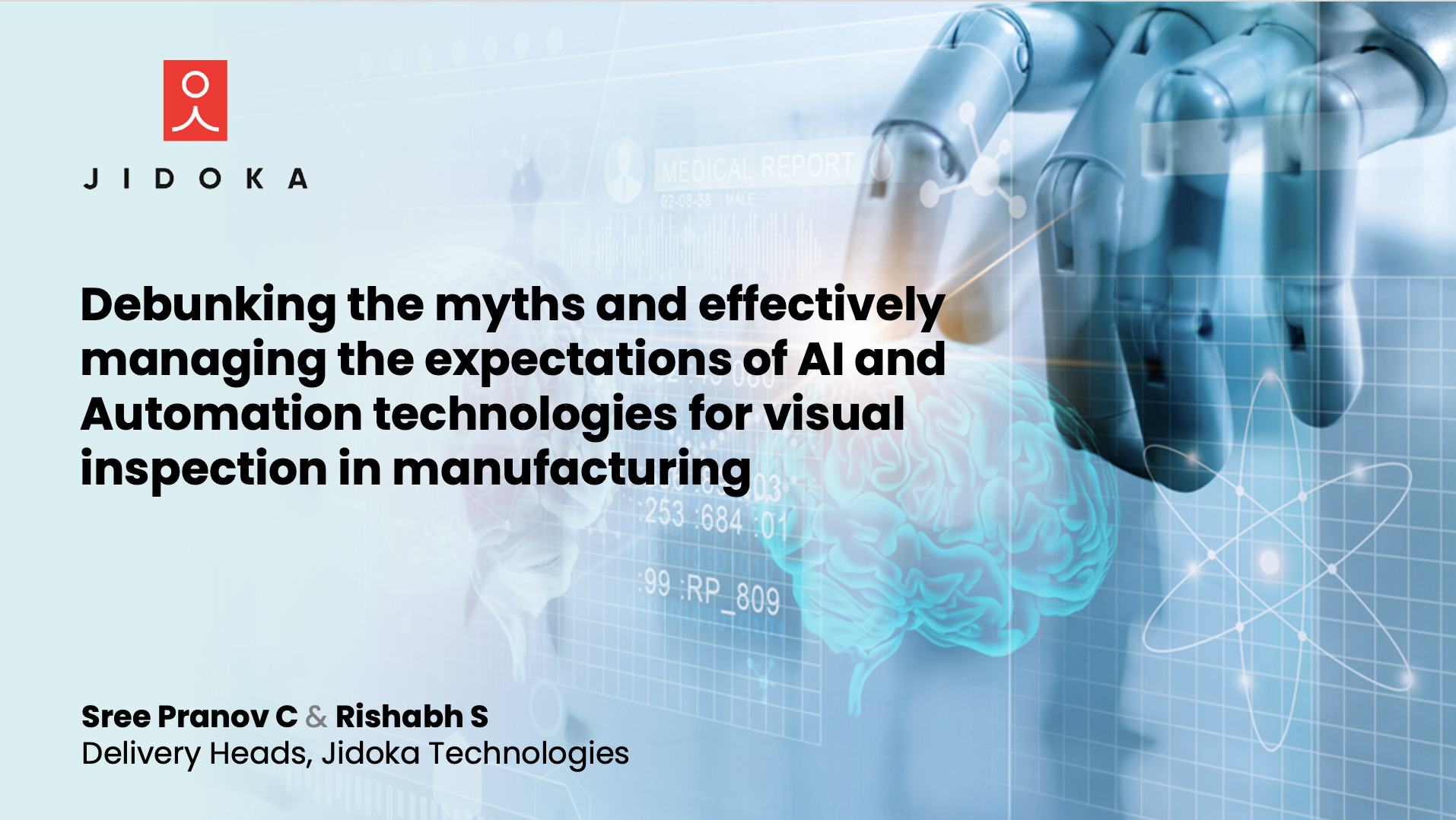Debunking the myths and effectively managing the expectations of AI and Automation technologies for visual inspection in manufacturing - Sree Pranov C and Rishabh S, Delivery Heads, Jidoka Technologies

In recent years, like with any other industry, manufacturing also has witnessed a paradigm shift in its operations and the usage of new-age technologies. AI and Automation technologies are embraced by manufacturers for their immense potential to enhance operations’ performance, efficiency, and productivity.
The improvement especially in quality control includes automated systems embedded with AI algorithms that help in detecting errors and addressing them in real-time. The AI-enabled visual inspection systems can perform these tasks with greater consistency and accuracy when compared to those manually done by QC engineers. These technologies also help in streamlining production processes with less human error. Repetitive tasks can be automated driving high levels of productivity. Downtime is minimized with the reduction in production cycle time and this approach is cost-effective in the long run. Furthermore, AI-driven technologies also enable manufacturers to offer customized products to their customers who seek them. Data-driven decision-making, faster time to market, and sustainable manufacturing practices are the other benefits of AI-driven systems.
To successfully implement AI and Automation technologies, it is crucial to manage the expectations of the users across the manufacturing industry. Misconceptions can lead to resistance to change with the technologies not optimally utilized. At the very outset, it is important to clear them and establish a true picture of what can be genuinely achieved, to avoid potential pitfalls. This exercise is crucial and helps in debunking the following myths while ensuring the successful implementation of the technologies.
Go-live happens in
iterations
The implementation of AI and Automation takes time and effort as the defects are subjective, and getting organizational buy-in can be a challenge across several levels of leadership. Sometimes this would mean making a few threshold changes or redefining defects and another iteration of validation. This is part of the change management that happens when a new methodology is implemented. Hence it is important to set realistic timelines taking into consideration the specific requirement and the complexity of the entire implementation process.
Complete replacement of
manual workers is possible
There is a misconception that AI and Automation will eliminate human
involvement, whereas, in reality, they can only augment the human
workforce. It is important to educate
stakeholders about the collaboration between humans and machines to deliver
results. The problem-solving qualities
of manual workers are very valuable and this aspect has to be well communicated
to avoid any misapprehensions. Functions such as re-work inspection or
secondary inspections for “not-ok” parts can be employed to ensure higher
product quality.
100% accuracy can be
easily achieved
Although new-age technologies have significantly advanced, they are not infallible, have several limitations, and will not operate with 100% accuracy immediately. It is extremely important to educate stakeholders about the limitations and expected accuracy levels. While AI and Automation technologies excel in repetitive tasks and analyzing data, complex decision-making is still a challenge to them. Providing an honest view of the technologies, their advantages, and limitations will help in establishing realistic expectations.
Calculating ROI based on
direct labor savings
Many a time Return on Investment is calculated as a direct cost of labor
savings whereas one has to actually look at it with respect to other aspects
such as,
?
Cost of poor quality – today this is between 10-15% of the manufacturing
cost.
?
Labor cost savings – Many operators can be re-purposed for more smart
and higher-end tasks.
? Brand Image – Poor quality products can lead to brand damage and even customer churn.
An immediate boost in
productivity is possible
It is important to note, fine-tuning and optimizing the system to carry out specific manufacturing processes is iterative and evolving. Continuous improvement and the need for slow transitioning should be clearly communicated. The time lag can be attributed to organizational changes, related innovation, and other cost adjustments. Stakeholders should be made aware of the actual time taken in the collaboration between manual workers and machines to achieve high productivity.
By employing cutting-edge Deep Learning technologies in Visual
inspection, manufacturers can achieve much higher precision, scale, and
throughput at a lower cost with little to no human interventions. Education through workshops and training
seminars on the benefits and limitations of these technologies will ensure
realistic expectations and enhance the user experience. Setting up of PoCs and
Demonstration Centers and sharing case studies will provide clarity on what to
expect with the entire implementation exercise.
It is equally crucial to involve all stakeholders right at the beginning
from the planning stage right up to the implementation stage while providing
the true picture of the functioning of the technologies. Projects implemented with realistic
expectations support the goals of digital transformation and ensure higher
product quality and better productivity of employees with consistency and
replicability.



